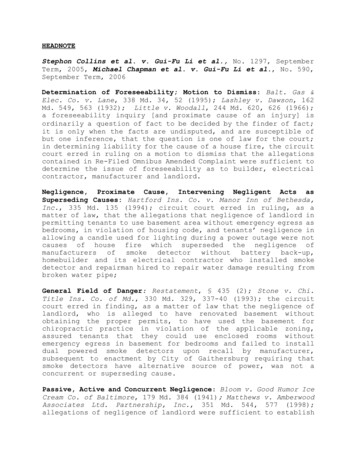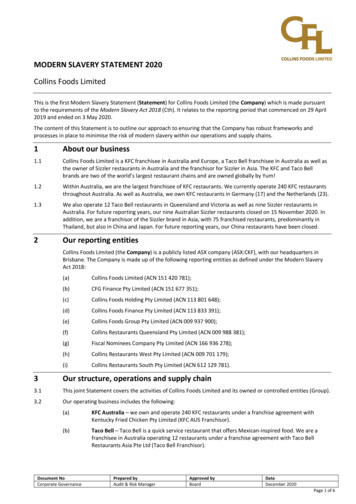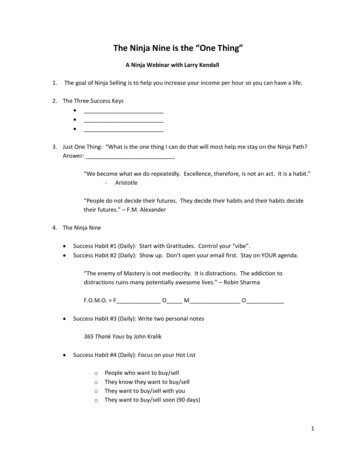
Transcription
HEADNOTEStephon Collins et al. v. Gui-Fu Li et al., No. 1297, SeptemberTerm, 2005, Michael Chapman et al. v. Gui-Fu Li et al., No. 590,September Term, 2006Determination of Foreseeability; Motion to Dismiss: Balt. Gas &Elec. Co. v. Lane, 338 Md. 34, 52 (1995); Lashley v. Dawson, 162Md. 549, 563 (1932); Little v. Woodall, 244 Md. 620, 626 (1966);a foreseeability inquiry [and proximate cause of an injury] isordinarily a question of fact to be decided by the finder of fact;it is only when the facts are undisputed, and are susceptible ofbut one inference, that the question is one of law for the court;in determining liability for the cause of a house fire, the circuitcourt erred in ruling on a motion to dismiss that the allegationscontained in Re-Filed Omnibus Amended Complaint were sufficient todetermine the issue of foreseeability as to builder, electricalcontractor, manufacturer and landlord.Negligence, Proximate Cause, Intervening Negligent Acts asSuperseding Causes: Hartford Ins. Co. v. Manor Inn of Bethesda,Inc., 335 Md. 135 (1994); circuit court erred in ruling, as amatter of law, that the allegations that negligence of landlord inpermitting tenants to use basement area without emergency egress asbedrooms, in violation of housing code, and tenants’ negligence inallowing a candle used for lighting during a power outage were notcauses of house fire which superseded the negligence ofmanufacturersofsmoke detectorwithoutbatteryback-up,homebuilder and its electrical contractor who installed smokedetector and repairman hired to repair water damage resulting frombroken water pipe;General Field of Danger: Restatement, § 435 (2); Stone v. Chi.Title Ins. Co. of Md., 330 Md. 329, 337-40 (1993); the circuitcourt erred in finding, as a matter of law that the negligence oflandlord, who is alleged to have renovated basement withoutobtaining the proper permits, to have used the basement forchiropractic practice in violation of the applicable zoning,assured tenants that they could use enclosed rooms withoutemergency egress in basement for bedrooms and failed to installdual powered smoke detectors upon recall by manufacturer,subsequent to enactment by City of Gaithersburg requiring thatsmoke detectors have alternative source of power, was not aconcurrent or superseding cause.Passive, Active and Concurrent Negligence: Bloom v. Good Humor IceCream Co. of Baltimore, 179 Md. 384 (1941); Matthews v. AmberwoodAssociates Ltd. Partnership, Inc., 351 Md. 544, 577 (1998);allegations of negligence of landlord were sufficient to establish
that it was active and continuing up to and including theoccurrence of fire rendering such negligence a concurrent ratherthan a superseding cause.
REPORTEDIN THE COURT OF SPECIAL APPEALSOF MARYLANDNo. 1297September Term, 2005STEPHON COLLINS ET AL.v.GUI-FU LI ET AL.No. 590September Term, 2006MICHAEL CHAPMAN ET AL.v.GUI-FU LI ET AL.Davis,Krauser,Meredith,JJ.Opinion by Davis, J.Filed: October 2, 2007
On June 14, 1998, Samuel Juster and Stephon Collins, Jr., thesons of appellants Collins and Juster, perished in a house fire.Appellants’ children were overnight guests of appellants, theChapmans, who rented a single family residence, located at 23Grantchester Place (Grantchester Place) in Gaithersburg, Maryland,from appellees, Mr. and Mrs. Gui-Fu Li (The Lis).Kyle Chapman, the son of appellant, Michael Chapman, wasseverely burned as a result of the fire and both of his legs wereamputated.Other Chapman family members also suffered injuries.The three Chapman children, as well as Samuel Juster and StephonCollins, Jr. had been sleeping in a bedroom in the basement of thehome.The fire was caused by a candle in the basement, which wasbeing used during an area–wide electrical outage caused by severethunderstorms.Due to the power outage, the AC-powered smokedetector in the basement was not activated.In the Circuit Court for Montgomery County, appellants suedGui-Fu Li and Chung Ling Li as landlords of the ntsInc.,SunbeamCorporation, BRK Brands, Inc. and Honeywell International, Inc.(themanufacturerdefendants),detectors in the subject home.asmanufacturersofthesmokeAppellants sued the Ryland Group,Inc. (Ryland) as the builder of the home and Summit Electric Co.(Summit) as the electrical subcontractor, for failing to installdual-power smoke detectors, e.g., AC-power with a safety batteryback-up, when the home was built in 1989 and for failing to provide
the owersmokeAppellants sued David Dieffenbach as well as hisemployee Kevin Hightower, alleging that they renovated the basementwithout permits in 1994, that they failed to replace the AC–powersmoke detectors with dual–power smoke detectors and that theyfailed to warn the owners and occupants that the enclosed rooms inthe basement could not be used as sleeping areas.On January 3, 2002, the trial court heard arguments andgranted several motions.The Motions for Summary Judgment ofappellees Dieffenbach and Hightower were granted.Dismiss of appellee Ryland was granted.The Motion toThe Motion to Dismiss orin the Alternative, Motion for Summary Judgment of appellee Summitwas granted.Appellants’ Motion for Reconsideration as to Rylandand Summit was denied on March 26, svoluntarily dismissed all claims against the remaining defendants.Appellants then filed an appeal against Ryland and Summit, in ereinappropriate and vacated them, remanding the case to the circuitcourt for further proceedings.On October 27, 2004, appellantsfiled a Re-Filed Omnibus Amended Complaint against appellees inthis case.After the case was refiled, the circuit court granted theMotion to Dismiss of the manufacturer defendants. Appellees Gui–Fu-2-
Li and Chung Ling Li then filed a Motion to Dismiss the claims onMarch 29,2006 asserted by the Chapman appellants and the circuitcourt granted this motion on April 20, 2006.Appellants Collins and Juster and the Chapman appellants filedthis timely appeal, presenting the following issues for our review,which we have rephrased and reordered:11The issues on appeal, as framed by appellants, are:I.Whether the court erred as a matter of law bygranting appellees, the Manufacturer Defendants’ Motionto Dismiss under Maryland Rule 2–322 on the grounds thatthe Omnibus Amended Complaint failed to include awell–pled allegation of proximate cause with regard tothe injuries sustained in the instant house fire, despitethe fact that the Manufacturer Defendants conceded forpurposes of the argument that the smoke detector itmanufactured was defective and inoperable on the eveningin question and despite the fact that the Complaintexpressly alleged that the defective and inoperable smokedetector was a substantial factor in causing the injuriesat bar.II.Whether the court erred as a matter of law bygranting appellees, Gui-Fu Li and Chung Ling Li’s Motionto Dismiss the claims asserted by the Chapman appellantsunder Maryland Rule 2–322 on the grounds that the OmnibusAmended Complaint failed to include a well-pledallegation of proximate cause with regard to the injuriessustained in the instant house fire, despite the factthat the Lis refinished the basement without obtainingpermits which would have barred the use of the basementas a sleeping area, despite the fact that the tations that the enclosed basement rooms could beused as sleeping areas, and the Lis knew and condonedsuch use by the Chapmans, and despite the fact that theComplaint expressly alleged that the defective smoke/firedetector and the use of the basement as a sleeping areawere substantial factors in causing the injuries at bar.III.Whether the court erred as a matter of law bygranting appellee Ryland Group’s Motion to Dismiss under-3-
Maryland Rule 2-322 on the grounds that the OmnibusAmended Complaint failed to include a well-pledallegation of proximate cause with regard to the injuriessustained in the instant house fire, despite the factthat Ryland conceded for purposes of the argument thatthe smoke detector it installed was defective andinoperable on the evening in question and despite thefact that the Complaint expressly alleged that thedefective and inoperable smoke detector was a substantialfactor in causing the injuries at bar.IV. Whether the court erred as a matter of law bygranting Summit Electric Co.’s Motion to Dismiss underMaryland Rule 2-322 on the grounds that the OmnibusAmended Complaint failed to include a well-pledallegation of proximate cause with regard to the injuriessustained in the instant house fire, despite the factthat Summit conceded for purposes of the argument thatthe smoke detector it installed was defective andinoperable on the evening in question and despite thefact that the Complaint expressly alleged that thedefective and inoperable smoke detector was a substantialfactor in causing the injuries at bar.V.Whether the court, to the extent it considered themotions of Ryland and Summit in response to the OmnibusAmended Complaint under the summary judgment standards ofMaryland Rule 2–501, erred by not continuing, under theprovisions of Rule 2-501(d), the hearing on AppelleesRyland Group and Summit Electric Co.’s Motions untildiscovery was completed.VI. Whether the court erred as a matter of law bygranting appellees Dieffenbach and Hightower’s Motionsfor Summary Judgment, because the issue of causation,including whether or not an intervening act is“foreseeable,” is a question of fact for the jury toresolve.A.Whether appellees Dieffenbach and Hightower’sfailure to apply for the proper permits in conjunctionwith the renovation of the home’s basement, therebydepriving the City of Gaithersburg the opportunity towarn the occupants that the basements could not belegally used as sleeping areas, proximately caused thedeaths of and injuries to appellants’ children[.]-4-
I. Whether the circuit court erred in determining,pursuant to motions to dismiss filed by the manufacturerdefendants, Ryland Homes, Summit Electric and the Lis,that the allegedintervening acts of negligence setforth in the Re-Filed Omnibus Amended Complaintconstituted a superseding cause, relievingA. the manufacturer defendants of liabilityfor negligence, design defect, failure towarn, strict liability, breach of expresswarranty and breach of implied warranties . Ryland Homes and Summit Electric ofliability for negligence, strict liability andfailure to warn and whether the circuit courterred in denying appellants’ request for acontinuance to conduct further discovery inproceeding against Ryland Homes; andC. the Lis of liability for negligence,violation of building codes and violation ofthe Consumer Protection Act.II. Whether the circuit court erred in granting bach and Hightower, finding, as a matter of law,that the undisputed facts did not support appellants’claims that Dieffenbach and HightowerA. had a duty to warn that the enclosedbasement rooms could not be used as sleepingareas;B.Whether appellees Dieffenbach and Hightower had aduty to replace or recommend that the outdated AC–powersmoke detector in the basement be replaced with a dualpower smoke detector[.]C.Whether appellees Dieffenbach and Hightower had aduty to warn the owners and/or occupants of the singlefamily home that the enclosed basement rooms could not beused as sleeping areas[.]-5-
B. were liable by reason in their failureto apply for and obtain the proper workingpermits before commencing repairs to thebasement of the subject property, therebypreventing inspectors from the City ofGaithersburgfromdiscoveringthatthebasement was being usedimproperly as asleeping area and consequently, preventing theinspectors from warning the occupants of theviolation; andC. had a duty to replace or recommend thatthe AC power smoke/fire detector be upgradedto one with an alternative power source ofwhentheyinstalledtwoorthreenewelectrical outlets in the basement after ithad flooded in 1994.Because the circuit court was limited, on the motions todismiss, to facts susceptible of but one inference, we shall holdthat it erred in determining whether the intervening acts manufacturer defendants, Summit Electric, Ryland Homes andtheGui-FuLi and Chung Ling Li of liability for the deaths and injuriessustained.We shall affirm the grant of the motions for summaryjudgment filed by David Dieffenbach and Kevin Hightower and holdthat izable duty with reference to the deaths and injuries sustainedby the Collins, Juster and Chapman children.Finally, in light ofour decision regarding the grant of Ryland’s motion to dismiss, weneed not reach the court’s denial of appellants’ request for acontinuance to conduct further discovery as to its claim againstRyland Homes.-6-
FACTUAL AND PROCEDURAL BACKGROUNDGui-Fu Li and Chung Ling Li purchased residential propertylocated at 23 Grantchester Place in Gaithersburg, Maryland from theRyland Group in 1989.Appellee Ryland Group was the builder ofGrantchester Place and Summit was the electrical subcontractor.When the home was built in 1989, appellees Ryland and Summitinstalled an AC-power smoke detector that was hard wired into thehome’s electrical system, but that did not have a safety batteryback–up on each level of the home.Gui-Fu Li, a chiropractor,renovated the basement for a medical office; these renovations,however, were performed without a building permit. When Dr. Libegan to treat his acupuncture patients in the finished basement,neighbors complained to the City of Gaithersburg about his homemedical office and he was cited for a zoning violation on June 6,1989.After the Lis were denied permission for a zoning variancefor a home medical office, they relocated their residence and,thereafter, sought to rent Grantchester Place.Michael Chapman and the Lis signed a rental agreement onAugust 13, 1991 and the Lis applied for and obtained a RentalLicense from the City of Gaithersburg on August 29, 1991.Theenclosed basement rooms had been used as bedrooms by the Chapmanchildren and the sleep–over guests of their children since 1994.Mr. Chapman lived in the home with his wife, Catherine Chapman, and-7-
their children, including his three boys from his prior marriage,Keith, Brandon and Kyle Chapman.Grantchester Place had a finished basement, which had threeenclosed rooms: (a) Brandon and Kyle Chapman’s bedroom, (b) KeithChapman’s bedroom, and (c) Mr. Chapman’s computer room/office. Thetwo basement bedrooms did not have any windows.In early 1994, a water pipe burst in Grantchester Place,causing extensive damage, especially to the basement, where a footof water had accumulated.On February 2, 1994, appellee, David E.Dieffenbach, trading as DEDHICO Home Improvements, submitted awritten proposal to the Lis and Mr. Chapman to repair the waterdamage for a total of 28,060. The contract itself indicates that“[t]he existing metal stud framing will be replaced and repaired tofacilitate replacement of the walls.”Dieffenbach did not applyfor and thus never obtained a building permit.Dieffenbach subsequently submitted two invoices for extrawork, which both showed that twenty electrical outlets in thebasement were cleaned and re-wired by an electrician at 17.50 peroutlet for a total cost of 350.Kevin Hightower, who is ajourneyman electrician and an employee of Dieffenbach, performedthe electrical re-wiring work.Hightoweradmittedthatheinstalledelectrical outlets in the basement.twoorthreenewNeither Dieffenbach norHightower obtained a permit for the electrical work performed fromthe City of Gaithersburg and they conceded that they were required-8-
lees’ failure to apply for a building and/or electricalpermit, the City of Gaithersburg did not inspect the work performedby appellees Dieffenbach and Hightower.Neither the Lis, Deiffenbach or HIghtower undertook to upgradethe basement’s AC–power smoke detector to dual-power smoke detectorin conjunction with the renovation project or to recommend anupgrade or to warn the owners or occupants of the limitations ofthe AC–power smoke old,StephonCollins, Jr. and twelve–year–old Samuel Juster were overnightguests of Keith, Brandon and twelve–year–old Kyle, the three sonsof Michael Chapman and Carolyn Hill Chapman, at Grantchester Place.That evening, powerful thunderstorms caused an area–wide electricalpower outage.Kyle andIn order to provide lighting in order that dcontinue playing their game of Monopoly, they lit approximately sixcandles in the basement bedroom where Kyle and Brandon slept.Keith Chapman, then seventeen years old, was the last of theboys to retire.He extinguished all but one of the candles atapproximately 4:30 a.m. and removed the one remaining lit candlefrom Kyle’s and Brandon’s bedroom, leaving it on a triangularcorner unit in the basement’s main recreational room.KeithChapman estimated that he went to bed at approximately 4:45 a.m.-9-
Some time around 5:00 a.m., Sunday, June 14, 1998, the ent’s main recreational room ignited a fire.unitintheBoth the FireInvestigation Report of the Bureau of Alcohol, Tobacco and ceDepartment concluded that the fire was ignited by the candle lefton the triangular corner unit.As noted, the smoke detectorlocated in the basement did not trigger an alarm due to the lack ofa back–up power source.Stephon Collins, Jr. and Samuel Justerperished as a result of the fire; Kyle Chapman suffered severeburns requiring the amputation of both legs and the minor Chapmanchildren suffered burns and injuries to their respiratory systems.THE RE-FILED OMNIBUS AMENDED COMPLAINTAppellants’ sixty-one-page Re-filed Omnibus Amended Complaintcontains twenty-six counts, all of which aver acts or omissions bythe defendants in relation to the smoke detectors and lack omissions, were in some way responsible for the lack of adequatewarning to the victims of the impending conflagration, whichappellants claim, resulted from the fact that the smoke detectordid not have “a battery back-up, or other alternative safety powersource in the event of an electrical outage or short.”-10-The
appellants also claim that the injuries and deaths were proximatelycaused by various acts and omissions by the Lis, resulting in theunauthorized use of an area in the basement for bedrooms.Count I and II, ¶¶ 39 through 46, as to the Lis, allegenegligence, violation of the Consumer Protection Act and wrongfuldeath as to the Juster and Collins appellants.Alleging that theCollins, Juster and Chapman boys sustained injuries and deathsbecause they were unable to escape the windowless bedrooms due tolack of any means of egress, the Re-Filed Omnibus Amended Complaintrecites that, had the Lis not performed the unauthorized renovationof the basement area for use as a home medical office, it “wouldhave remained an empty concrete shell without even electricaloutlets [under which] inhospitable conditions, the children wouldnot have used the Chapman’s basement as a sleeping area on June 14,1998; and [appellants’] children would not have perished.”Anaffirmative duty is also alleged, i.e., that, had the Lis “warnedtheir tenants, [appellants’] children would not have been sleepingin the enclosed basement bedrooms. . . .”The Complaint alleges the following sequence of events whichconstitute the negl
detectors in the subject home. Appellants sued the Ryland Group, Inc. (Ryland) as the builder of the home and Summit Electric Co. (Summit) as the electrical subcontractor, for failing to install dual-power smoke detectors, e.g., AC-power with a safety battery back-up, when the home was built in











